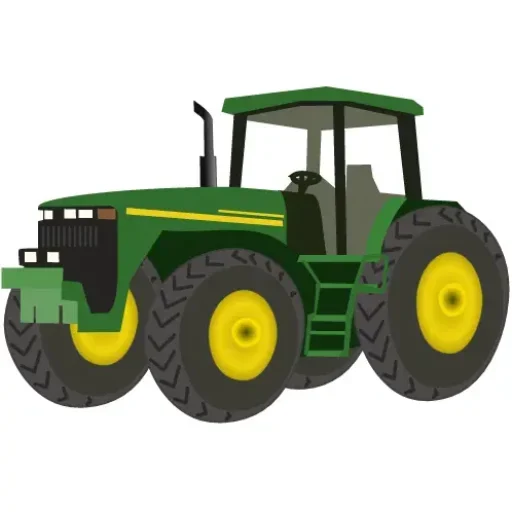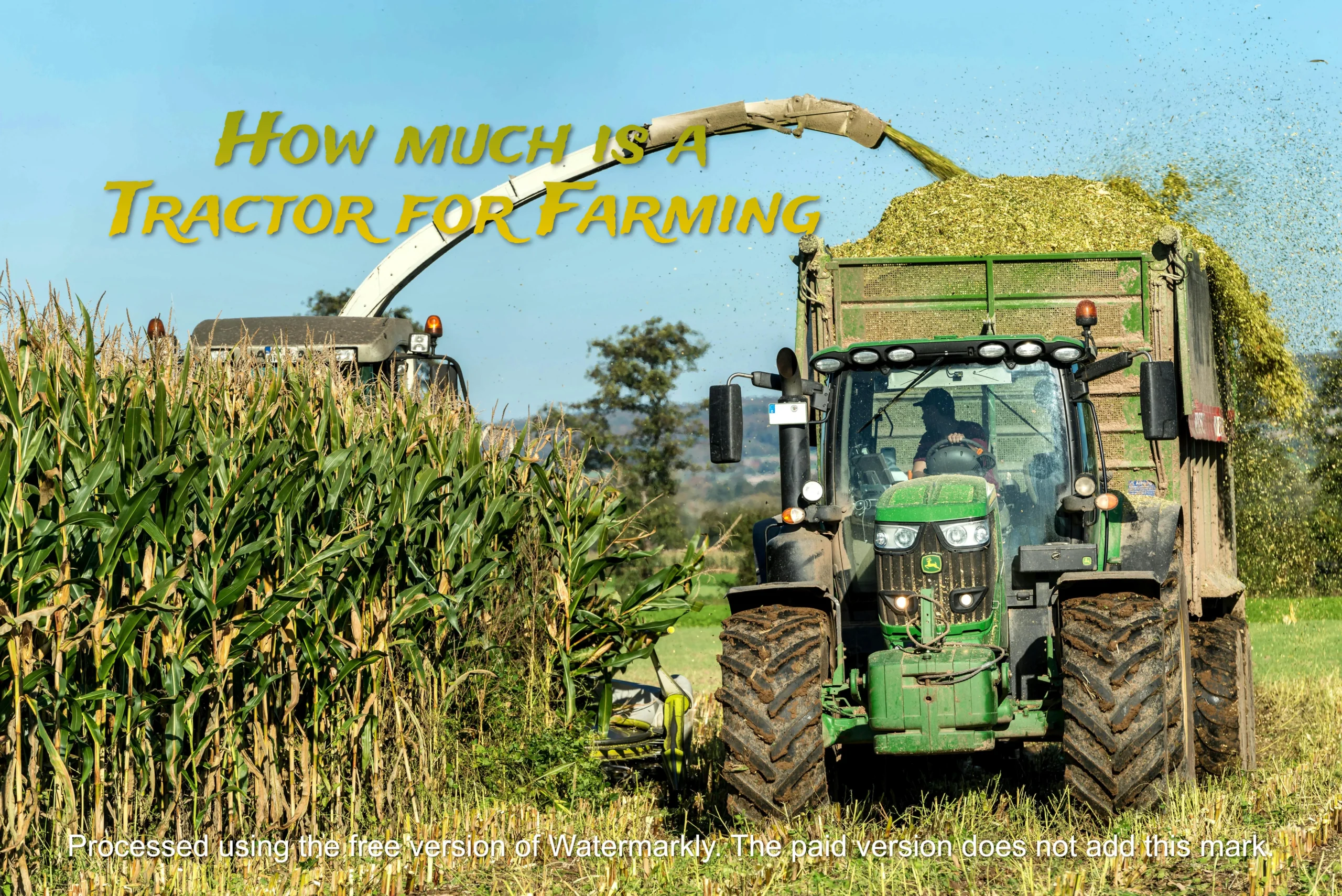The cost of a tractor for farming can vary widely based on its size, horsepower, brand, and features. Generally, small to mid-sized tractors suitable for most farming tasks range from $25,000 to $75,000. Larger, more powerful tractors with advanced features can cost upwards of $100,000 to $200,000 or more. Factors such as new vs. used, attachments, and technological advancements also influence the price.
Introduction
Tractors are the backbone of modern agriculture, serving as versatile workhorses that power countless farming operations worldwide. From small family farms to large commercial enterprises, tractors play a crucial role in improving efficiency, productivity, and overall farm management. However, one of the most common questions aspiring farmers and those looking to upgrade their equipment ask is, “How much is a tractor for farming?”
This comprehensive guide aims to answer that question and provide valuable insights into the world of farm tractors. We’ll explore the various factors that influence tractor prices, examine different types and sizes of tractors, and discuss the features and technologies that can impact their cost. Additionally, we’ll delve into the benefits of investing in a quality tractor, financing options, and considerations for both new and used equipment.
Whether you’re a seasoned farmer looking to expand your fleet or a newcomer to the agricultural industry, this article will equip you with the knowledge needed to make an informed decision when purchasing a tractor for your farming needs.
The cost of a farming tractor varies widely based on factors such as size, brand, and features.
Small Tractors (20-50 HP): Ideal for small farms and gardens, these typically cost between $10,000 and $30,000.
Mid-Size Tractors (50-100 HP): Suitable for medium to large farms, prices range from $30,000 to $70,000.
Large Tractors (100+ HP): Used for extensive farming operations, these can cost anywhere from $70,000 to over $150,000.
Understanding Tractor Basics
Before diving into the costs associated with farm tractors, it’s essential to understand the basic components and functions of these machines.
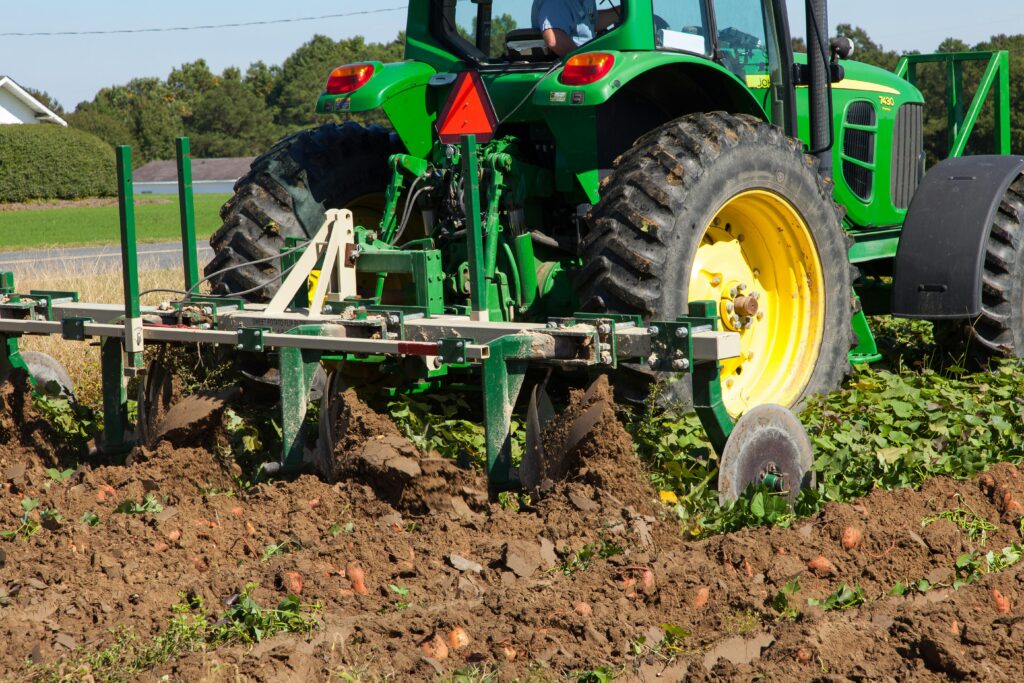
What Is a Farm Tractor?
A farm tractor is a powerful vehicle designed specifically for agricultural use. Its primary purpose is to provide high torque at slow speeds, making it ideal for pulling heavy loads and powering various farm implements. Tractors typically feature large, rugged tires, a powerful engine, and a system of gears that allow for different speed and power configurations.
Key Components of a Tractor
- Engine
- Transmission
- Power Take-Off (PTO)
- Hydraulic system
- Hitch
- Wheels and tires
- Operator cabin or platform
Common Uses of Farm Tractors
Tractors are incredibly versatile machines that can be used for a wide range of farming tasks, including:
- Plowing and tilling
- Planting and seeding
- Harvesting
- Hauling and transport
- Mowing and landscaping
- Snow removal
- Operating stationary equipment (e.g., grain augers, water pumps)
Factors Affecting Tractor Prices
The cost of a farm tractor can vary significantly based on several factors. Understanding these factors will help you better estimate the price range for the type of tractor that suits your needs.
Horsepower
One of the most significant factors influencing tractor prices is horsepower. Generally, the more powerful the tractor, the higher the price. Tractors can range from small 20-horsepower models suitable for hobby farms to large 600-horsepower machines used in extensive commercial operations.
Size and Class
Tractors are typically categorized into different size classes, which correspond to their power and intended use:
- Compact tractors (15-50 HP)
- Utility tractors (50-140 HP)
- Row crop tractors (140-400 HP)
- 4WD tractors (400+ HP)
As you move up in size and class, the price of the tractor generally increases.
Brand and Manufacturer
Well-known brands with established reputations for quality and reliability often command higher prices. Some popular tractor brands include:
- John Deere
- Case IH
- New Holland
- Kubota
- Massey Ferguson
- Fendt
- Claas
Features and Technology
Modern tractors come equipped with a wide range of features and technologies that can significantly impact their price. These may include:
- GPS and precision farming systems
- Advanced transmission systems (e.g., CVT, Power Shift)
- Comfort features (e.g., air-conditioned cabins, ergonomic controls)
- Automated steering systems
- Telematics and remote monitoring capabilities
New vs. Used
The choice between a new and used tractor can have a substantial impact on the price. New tractors offer the latest features and full warranty coverage but come at a premium. Used tractors can be more affordable but may require more maintenance and lack the latest technologies.
Tractor Price Ranges
To give you a better idea of what to expect in terms of tractor prices, let’s break down the cost ranges for different types and sizes of tractors.
Compact Tractors (15-50 HP)
Compact tractors are ideal for small farms, large gardens, and light-duty tasks. They typically range in price from $10,000 to $30,000 for new models.
| Horsepower Range | New Tractor Price Range |
|---|---|
| 15-25 HP | $10,000 – $15,000 |
| 25-35 HP | $15,000 – $22,000 |
| 35-50 HP | $22,000 – $30,000 |
Utility Tractors (50-140 HP)
Utility tractors are versatile machines suitable for a wide range of farm tasks. New utility tractors typically cost between $30,000 and $100,000.
| Horsepower Range | New Tractor Price Range |
|---|---|
| 50-75 HP | $30,000 – $50,000 |
| 75-100 HP | $50,000 – $75,000 |
| 100-140 HP | $75,000 – $100,000 |
Row Crop Tractors (140-400 HP)
Row crop tractors are designed for larger farms and more demanding tasks. Prices for new models in this category can range from $100,000 to $300,000.
| Horsepower Range | New Tractor Price Range |
|---|---|
| 140-200 HP | $100,000 – $175,000 |
| 200-300 HP | $175,000 – $250,000 |
| 300-400 HP | $250,000 – $300,000 |
4WD Tractors (400+ HP)
Large 4WD tractors are the most powerful and expensive options, typically used on extensive commercial farms. New models in this category can cost anywhere from $300,000 to over $600,000.
| Horsepower Range | New Tractor Price Range |
|---|---|
| 400-500 HP | $300,000 – $400,000 |
| 500-600 HP | $400,000 – $500,000 |
| 600+ HP | $500,000 – $600,000+ |
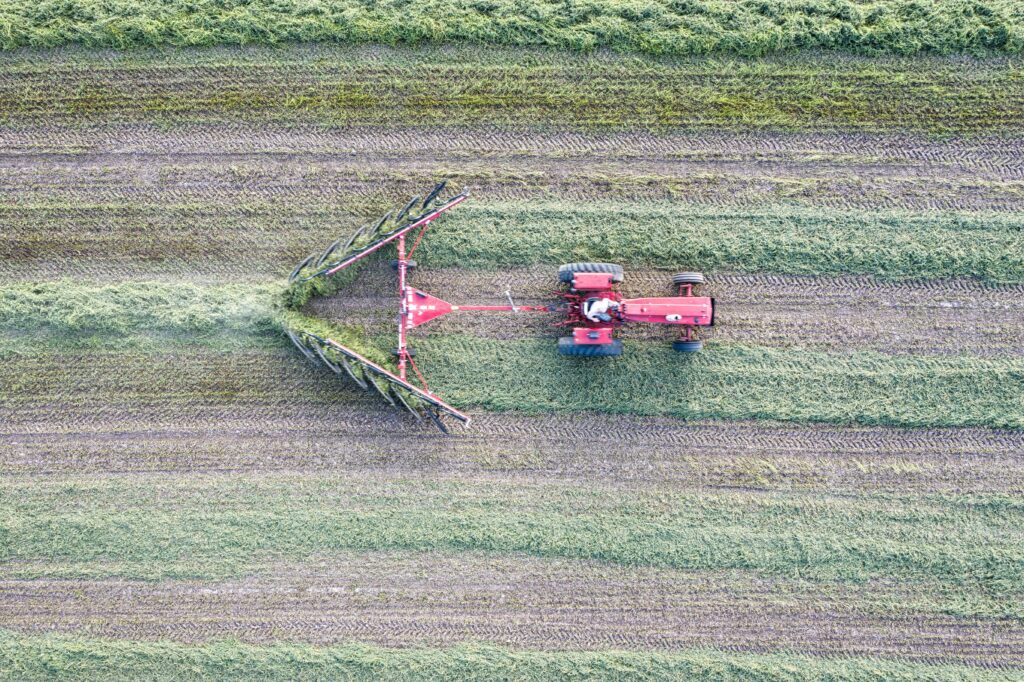
New vs. Used Tractors: Pros and Cons
When considering how much to spend on a tractor for farming, one of the most significant decisions is whether to buy new or used equipment. Let’s explore the advantages and disadvantages of each option.
New Tractors
Pros:
- Latest technology and features
- Full warranty coverage
- Better fuel efficiency and emissions compliance
- Lower maintenance costs in the early years
- Customization options
Cons:
- Higher initial cost
- Rapid depreciation in the first few years
- Higher insurance costs
Used Tractors
Pros:
- Lower initial cost
- Slower depreciation
- Potentially better value for money
- Lower insurance costs
Cons:
- Limited or no warranty coverage
- Higher maintenance costs
- Outdated technology and features
- Uncertain history and potential hidden problems
- Limited customization options
Features and Technologies That Impact Tractor Prices
Modern farm tractors come equipped with a wide range of features and technologies that can significantly influence their price. Understanding these options can help you determine which features are essential for your farming needs and how they affect the overall cost of the tractor.
Transmission Systems
The type of transmission system in a tractor can have a substantial impact on its price and performance.
Manual Transmission
- Most basic and affordable option
- Requires more skill to operate efficiently
- Typically found in older or less expensive models
Power Shift Transmission
- Allows for seamless gear changes without clutching
- More expensive than manual transmissions
- Improves efficiency and reduces operator fatigue
Continuously Variable Transmission (CVT)
- Offers infinite speed variations within a range
- Provides optimal fuel efficiency and performance
- Most expensive transmission option
Precision Farming Systems
Precision farming technologies have revolutionized modern agriculture, but they come at a premium.
GPS Guidance Systems
- Improves accuracy in field operations
- Reduces overlap and increases efficiency
- Can add $5,000 to $20,000 to the tractor’s price
Automated Steering Systems
- Allows for hands-free operation in the field
- Reduces operator fatigue and improves precision
- Can cost an additional $10,000 to $30,000
Telematics and Remote Monitoring
- Provides real-time data on tractor performance and location
- Enables predictive maintenance and improved fleet management
- May add $2,000 to $5,000 to the tractor’s price
Comfort and Ergonomics
Operator comfort features can significantly impact productivity and tractor prices.
Climate-Controlled Cab
- Provides a comfortable working environment in all weather conditions
- Can add $5,000 to $15,000 to the tractor’s price
Ergonomic Controls and Seating
- Reduces operator fatigue and improves productivity
- May increase the tractor’s price by $2,000 to $5,000
Noise Reduction Technologies
- Improves operator comfort and safety
- Can add $1,000 to $3,000 to the tractor’s cost
Hydraulic Systems
Advanced hydraulic systems improve the tractor’s versatility and performance but come at a higher cost.
Standard Hydraulics
- Basic system for operating implements
- Included in the base price of most tractors
Load-Sensing Hydraulics
- Improves efficiency and reduces fuel consumption
- Can add $3,000 to $8,000 to the tractor’s price
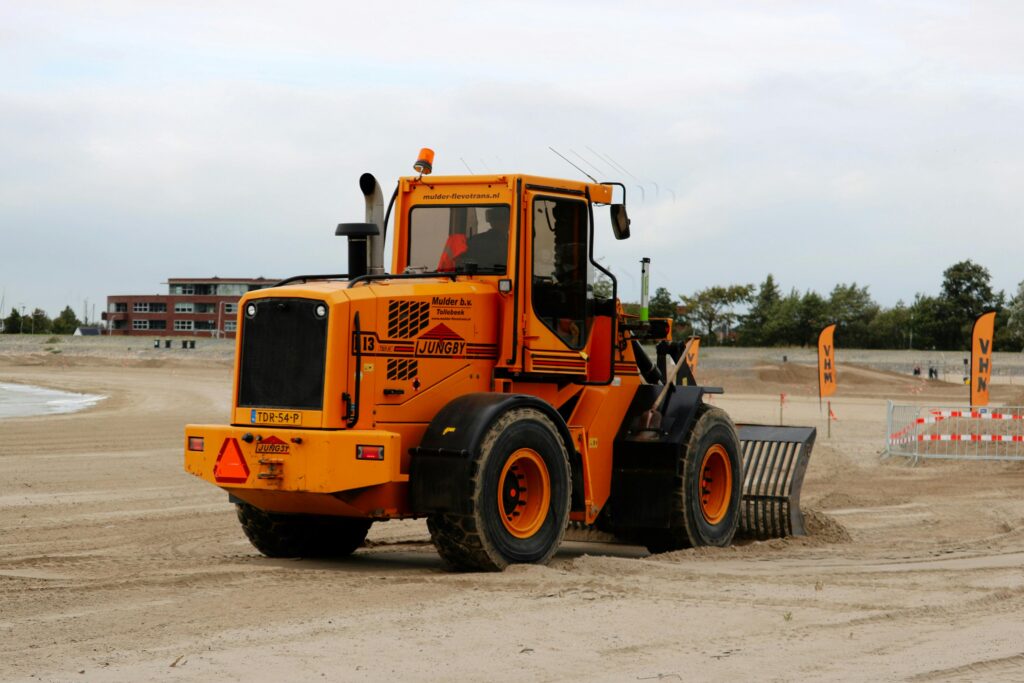
Financing Options for Farm Tractors
Given the significant investment required for purchasing a farm tractor, many farmers opt for financing options to manage the cost. Here are some common financing methods available:
Bank Loans
- Traditional financing option
- Interest rates typically range from 3% to 8%
- Loan terms can vary from 3 to 7 years
- Requires good credit score and financial history
Manufacturer Financing
- Often offered directly by tractor manufacturers or dealers
- May include special promotions or low-interest rates
- Can be more flexible with credit requirements
- Terms typically range from 3 to 6 years
Equipment Leasing
- Allows farmers to use the tractor without owning it
- Lower monthly payments compared to purchasing
- Options to buy the tractor at the end of the lease term
- May provide tax benefits in some cases
USDA Farm Service Agency (FSA) Loans
- Government-backed loans for farmers
- Often have lower interest rates and more favorable terms
- Designed to help beginning farmers and those who may not qualify for traditional financing
- Loan limits and eligibility requirements apply
Farm Credit System
- Network of borrower-owned lending institutions
- Specializes in agricultural financing
- Offers competitive rates and terms for farm equipment
- May provide additional services such as crop insurance and financial planning
When considering financing options, it’s essential to compare the total cost of ownership, including interest payments, over the life of the loan. Additionally, consider how the monthly payments will fit into your farm’s cash flow and overall financial plan.
Factors to Consider When Choosing a Tractor
Selecting the right tractor for your farming needs involves more than just considering the price. Here are some key factors to keep in mind when making your decision:
Farm Size and Type
- Consider the acreage you need to cover
- Evaluate the types of crops or livestock you’re managing
- Assess the terrain and soil conditions on your farm
Required Tasks and Implements
- List the specific tasks you need the tractor to perform
- Identify the implements you plan to use with the tractor
- Ensure the tractor has sufficient power and compatibility for your needs
Fuel Efficiency and Operating Costs
- Compare fuel consumption rates between different models
- Consider the availability and cost of fuel in your area
- Factor in maintenance and repair costs over the tractor’s lifetime
Dealer Support and Parts Availability
- Research the reputation and reliability of local dealers
- Check the availability of spare parts and service technicians
- Consider the proximity of dealerships to your farm
Resale Value and Longevity
- Investigate the typical lifespan of different tractor models
- Research the resale values of various brands and models
- Consider how long you plan to keep the tractor
Operator Comfort and Ease of Use
- Test drive different models to assess comfort and ergonomics
- Consider the skill level of potential operators
- Evaluate the intuitiveness of controls and features
Future Farm Growth and Expansion Plans
- Think about your farm’s potential growth in the coming years
- Consider whether the tractor will meet your future needs
- Assess the potential for upgrading or adding features later
By carefully considering these factors alongside the price, you can make a more informed decision that balances cost with functionality and long-term value.
Hidden Costs of Tractor Ownership
When budgeting for a farm tractor, it’s crucial to look beyond the initial purchase price and consider the total cost of ownership. Here are some hidden costs that can significantly impact the overall expense of owning and operating a tractor:
Maintenance and Repairs
Regular maintenance is essential for keeping your tractor in good working condition and preventing costly breakdowns. Some maintenance costs to consider include:
- Oil and filter changes
- Tire replacements
- Belt and hose replacements
- Hydraulic fluid changes
- Battery replacements
As the tractor ages, repair costs may increase. It’s wise to budget for potential major repairs such as:
- Engine overhauls
- Transmission repairs
- Electrical system repairs
Fuel Costs
Fuel consumption can vary significantly between tractor models and depends on the type of work being performed. Factors affecting fuel costs include:
- Engine efficiency
- Tractor size and power
- Type of fuel used (diesel, gasoline, or alternative fuels)
- Workload and operating conditions
Insurance
Tractor insurance is essential to protect your investment. Insurance costs can vary based on factors such as:
- Tractor value
- Coverage type (liability, comprehensive, collision)
- Location and farm size
- Claims history
Training and Certification
Proper operation of modern tractors may require specialized training or certification, especially for advanced features like precision farming systems. Costs may include:
- Operator training courses
- Safety certifications
- Software and technology training
Implements and Attachments
The cost of implements and attachments needed to perform various tasks can often exceed the price of the tractor itself. Common attachments include:
- Plows and cultivators
- Seeders and planters
- Sprayers
- Balers and mowers
- Front-end loaders
Storage and Security
Proper storage of your tractor can extend its lifespan and reduce maintenance costs. Expenses may include:
- Construction or rental of a storage shed or barn
- Security systems to prevent theft or vandalism
Software and Technology Updates
For tractors equipped with advanced technology, ongoing costs may include:
- Software updates and subscriptions
- GPS and mapping service fees
- Data analysis tools
Depreciation
While not an out-of-pocket expense, depreciation represents the loss in value of your tractor over time. Factors affecting depreciation include:
- Brand and model reputation
- Hours of use
- Maintenance history
- Market conditions
By factoring in these hidden costs, you can develop a more accurate picture of the total investment required for a farm tractor and make a more informed decision based on your long-term financial planning.
Tractor Attachments and Implements
When budgeting for a tractor, it’s crucial to consider the cost of necessary attachments and implements. These can significantly increase your total investment but are essential for maximizing the tractor’s utility.
Common Attachments and Their Approximate Costs:
| Attachment | Approximate Cost Range |
|---|---|
| Front-End Loader | $3,000 – $12,000 |
| Rotary Cutter | $2,000 – $8,000 |
| Box Blade | $500 – $3,000 |
| Backhoe | $6,000 – $15,000 |
| Plow | $2,000 – $10,000 |
| Disc Harrow | $1,500 – $8,000 |
| Seeder/Planter | $3,000 – $20,000+ |
The actual cost will vary based on the size, quality, and compatibility with your specific tractor model.
Seasonal Considerations
The time of year you purchase a tractor can affect its price. Many dealers offer seasonal promotions or discounts:
- Winter: Often the best time for deals, as it’s typically a slower season for tractor sales.
- Early Spring: Prices may increase as demand rises for the upcoming farming season.
- Late Fall: Dealers may offer discounts to clear inventory before the end of the year.
Tax Implications
Purchasing a farm tractor can have significant tax implications:
- Section 179 Deduction: Allows farmers to deduct the full purchase price of qualifying equipment (including tractors) from their gross income in the year of purchase.
- Bonus Depreciation: Offers additional first-year depreciation deduction on top of the normal depreciation allowance.
- State-specific tax incentives: Some states offer additional tax benefits for agricultural equipment purchases.
Consult with a tax professional to understand how these deductions and incentives might apply to your specific situation.
Energy Efficiency and Environmental Considerations
As environmental concerns become increasingly important, consider the following when evaluating tractor costs:
- Fuel Efficiency: More efficient engines can lead to significant savings over time.
- Emissions Standards: Newer tractors meet stricter emissions standards, which may be required in some areas and can lead to better fuel economy.
- Alternative Fuels: Some tractors can run on biodiesel or other alternative fuels, potentially reducing operating costs and environmental impact.
Training and Operator Efficiency
The cost of training operators to efficiently use modern tractors should be factored into your budget:
- Basic Operation Training: $500 – $1,500 per operator
- Advanced Technology Training (e.g., GPS systems): $1,000 – $3,000 per operator
- Ongoing Education: Budget for periodic refresher courses and training on new features
Efficient operators can significantly reduce fuel consumption and wear on the tractor, leading to long-term cost savings.
Resale Value Considerations
When assessing the total cost of ownership, consider the tractor’s potential resale value:
- Popular brands like John Deere, Case IH, and New Holland often retain value better.
- Well-maintained tractors with complete service records typically command higher resale prices.
- Tractors with universal appeal (e.g., versatile utility tractors) may be easier to resell than highly specialized models.
Warranty and Extended Service Plans
Factor in the cost and potential savings of warranty and service plans:
- Standard Warranty: Usually included in the purchase price, covering major components for 1-3 years.
- Extended Warranty: Can cost $1,000 – $5,000+ depending on coverage and duration.
- Service Plans: May cost $500 – $2,000+ annually but can provide peace of mind and predictable maintenance costs.

Conclusion
Determining the cost of a tractor for farming is a complex process that involves considering various factors, from the size and power of the machine to the specific features and technologies it offers. While prices can range from around $10,000 for a small compact tractor to over $600,000 for a large, high-powered 4WD model, the true cost of ownership extends far beyond the initial purchase price.
When budgeting for a farm tractor, it’s crucial to consider the total cost of ownership, including maintenance, fuel, insurance, and potential upgrades. Additionally, factors such as farm size, type of operations, and future growth plans should play a significant role in your decision-making process.
Whether you choose to invest in a new tractor with the latest technologies or opt for a used model to manage costs, careful research and consideration of your specific needs will help ensure you make the best choice for your farming operation. Remember that the right tractor is not necessarily the most expensive one, but rather the one that offers the best balance of performance, reliability, and value for your unique situation.
By understanding the various factors that influence tractor prices and considering both the visible and hidden costs of ownership, you can make an informed decision that will support your farming goals for years to come. As with any significant investment in your farm’s future, take the time to consult with experts, compare options, and carefully weigh the long-term benefits against the costs before making your final decision.
(FAQs)
1. How much does a small farm tractor cost?
A small farm tractor, typically in the compact or utility category, can cost anywhere from $10,000 to $50,000 for new models. Used small farm tractors may be available for $5,000 to $30,000, depending on their age, condition, and features. The exact price will vary based on factors such as horsepower, brand, and included attachments.
2. What’s the average cost of a mid-size tractor for a 100-acre farm?
For a 100-acre farm, a mid-size tractor in the 75-100 horsepower range is often suitable. New tractors in this category typically cost between $50,000 and $75,000. However, the price can vary significantly based on the brand, features, and specific farm requirements. Used tractors in this range might be available for $30,000 to $50,000, depending on their age and condition.
3. How much should I budget for a large commercial farm tractor?
Large commercial farm tractors, such as those used for row crop farming or extensive operations, can range from $100,000 to over $500,000 for new models. These tractors typically have 200+ horsepower and come equipped with advanced features and technologies. The exact budget will depend on the size of your operation, specific needs, and desired features. It’s not uncommon for large farms to invest $250,000 or more in a single high-end tractor.
4. Is it more cost-effective to buy a new or used tractor?
The cost-effectiveness of buying a new versus used tractor depends on various factors:
- New tractors offer the latest technology, full warranty coverage, and potentially lower maintenance costs in the early years. However, they come with a higher initial price and rapid depreciation.
- Used tractors are more affordable upfront and depreciate more slowly, but may have higher maintenance costs and lack the latest features.
For many farmers, a well-maintained used tractor that’s 3-5 years old can offer the best balance of cost and value. However, if having the latest technology is crucial for your operation, a new tractor might be worth the investment.
5. How do financing options affect the overall cost of a farm tractor?
Financing options can significantly impact the total cost of owning a farm tractor:
- Interest rates: Lower rates can save thousands of dollars over the life of the loan.
- Loan term: Longer terms reduce monthly payments but increase total interest paid.
- Down payment: A larger down payment reduces the loan amount and interest charges.
- Special promotions: Manufacturer financing may offer low or zero-interest periods.
For example, on a $100,000 tractor:
- 5-year loan at 5% interest: Total cost ≈ $113,000
- 5-year loan at 3% interest: Total cost ≈ $108,000
- 7-year loan at 5% interest: Total cost ≈ $118,000
